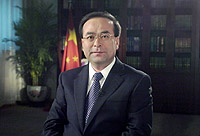|
 |
|
BUMPER HARVEST: Mechanized harvesters in Yuanyang County, Henan Province, harvest wheat on June 5 |
In June, Minister of Agriculture Sun Zhengcai announced a nationwide summer re-harvest in a major grain producing area in Lianyungang, Jiangsu Province. It was the the first time China saw summer grain output growth for six year in a row since the founding of the People's Republic in 1949.
 |
|
Minister of Agriculture Sun Zhengcai | A couple of months ago, a serious drought settled over some southern and northern areas. The Ministry of Agriculture immediately launched an emergency response operation and made arrangements to deal with it.
Although the drought hit some areas where autumn grain production had commenced, it was not a major natural disaster, said Sun.
Sun has been busy since he became the minister in 2006. "I've been to all the provinces, autonomous regions and municipalities on China's mainland," he told Xinhua News Agency.
"Agriculture is the world's strategic industry. It is the first thing needed for people's livelihoods. The stable development of grain and other major agricultural products can ensure that the country is able to deal with various difficulties," he said.
Sun has been under a great deal of pressure. "We have an ancient saying in China that says hunger breeds discontent," said Sun. "Ensuring the livelihood of 1.3 billion people is a huge task."
Sun often quotes Dean Acheson, the U.S. Secretary of State in 1949, who said on the eve of the founding of the New China that the first problem that every Chinese Government would encounter was how to feed the people.
Chinese people have proven that the goal can be achieved. From 1949 to 2008, China's grain output grew from 113 million tons to 529 million tons annually, and cotton output increased from 444,000 tons to 8 million tons annually, according to statistics from the Ministry of Agriculture. Grain, vegetables, fruits, meat, aquatic products and other major agricultural production have ranked first in the world for many years. With less than 10 percent of world's arable land, China has fed 22 percent of the world's population.
Sun said these achievements are attributable to three major rural policies. First was the implementation of the household contract responsibility system with remuneration linked to outputs that was adopted in the late 1970s. It is the cornerstone of China's rural policy, establishing the dominant position of farmers in production and operation and raising farmers' enthusiasm to produce. Second was the reduction and eventual abolition of the agricultural tax, which greatly diminished the burden on farmers. Third was the implementation of a comprehensive rural reform, which included nine-year compulsory education in rural areas and implementation of a fiscal management system in counties and townships.
Although the People's Republic has enjoyed great development in this field, the agricultural base is still weak, said Sun.
Statistics from the Ministry of Agriculture show that the per-capita net income of rural residents increased from 44 yuan ($6.4) in 1949 to 4,761 yuan ($697) in 2008. But the rate of increase is far below that of urban residents.
Sun said the gap between rural and urban areas is still very large. He said increasing the income of rural people is one of his top priorities.
The right policy direction, Sun said, is to maintain the stable development of agriculture, improve agricultural science and technology and increase the farmers' incomes. | 